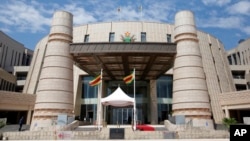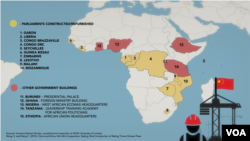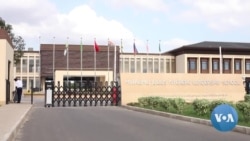Zimbabwe’s new parliament gives an architectural nod to the country’s famous ancient ruins; Lesotho’s has a design resembling a “mokorotlo,” the conical straw hat that’s part of national dress; and Malawi’s has a dome that looks like a calabash.
These local elements make these modern parliaments notable departures from southern Africa’s old European-style legislatures built in colonial times, but in fact the new buildings were also designed and built by a foreign power: China.
Despite the African design elements, the imposing buildings aren’t that different from China’s own brutalist architecture, and stand out in developing countries, some of which, like Malawi, are among the poorest in the world.
Africa’s largest trade partner has become known for its multibillion-dollar Belt and Road Initiative infrastructure projects on the continent, such as railways and ports. But for years it has also been building grand new parliaments and other government buildings, which cost less but are equally part of Beijing's diplomatic push in the region.
These buildings, like the new $200 million Zimbabwean parliament, which opened last year, are usually given as gifts, with no loans attached.
“The prestige diplomacy helps to strengthen China’s ties with the African governments, especially the top leaders,” according to Yun Sun, director of the China program at the Stimson Center.
“Building a government building named after a president does not cost much, but the goodwill and reputational benefits are tremendous,” she told VOA.
What’s in it for China?
China has so far built or refurbished parliaments in some 15 African countries, including the Republic of Congo, Liberia, Mozambique, the Seychelles and Guinea Bissau, as well as other government buildings such as Burundi’s presidential palace and the African Union headquarters in Ethiopia.
Innocent Batsani-Ncube, a postdoctoral researcher at SOAS University of London, has a forthcoming book on China’s parliaments in Africa. He told VOA such buildings aren’t just bricks and mortar; “you have to locate this within this idea of building influence.”
Beyond goodwill from African leaders, China’s parliament-building drive benefits the Asian giant in multiple other ways, he says.
It allows Beijing to gauge the “political temperature” of a country, he says, because while China often deals directly with ruling parties on the continent, in a multi-party democracy you’ll find all political factions in the parliament and it’s the one place China can connect with the opposition — which is valuable just in case there’s regime change.
“It provides a way of hedging their bets,” says Batsani-Ncube.
Even in political systems dominated by one party, he notes, there’s occasional leadership turnover and “it’s not enough to target the guy who’s in power now, you have to play the long game.”
Paul Nantulya, a research associate at the Africa Center for Strategic Studies, echoes that idea, saying “it affords China the opportunity to cultivate local elites.”
While it might garner the Chinese political savvy and connections as well as open the doors for Chinese economic interests, analyst Yunnan Chen says China’s parliament-building drive is not necessarily an attempt to export Beijing’s one-party system.
“I think it would be a very convoluted argument to make that the structure of a building carries a philosophy with it,” said Chen, a researcher at the Overseas Development Institute (ODI), an independent global think tank. But, she noted, China does provide training and foreign exchanges for African government officials.
Batsani-Ncube agrees that the architectural efforts are different from more overtly political initiatives such as a leadership academy for African politicians opened by China last year in Tanzania. Beijing seems indifferent to the political systems in the countries where it is building parliaments, he says.
SEE ALSO: A related video by VOA's Charles Kombe
Concerns have also been raised that the new buildings could be equipped for future Chinese espionage in light of a 2018 controversy over the reported bugging of the Chinese-built African Union headquarters in Ethiopia — something Beijing has repeatedly denied.
Asked about such concerns by reporters ahead of the opening of the new parliament in Zimbabwe last year, Cai Libo, from Shanghai Construction Group, the government-owned company that built it, responded that China and Zimbabwe were friends and “you would not do such kind of things to your friends.”
SEE ALSO: A related video by VOA's Columbus Mavhunga
What’s in it for Africa?
The Washington-based Heritage Foundation, whose research on the topic has found that “since 1966, Chinese companies have built or renovated at least 186 African government buildings,” said China’s “palace diplomacy” serves “little purpose other than to curry favor with recipient governments.”
But the ODI’s Chen says many of the new buildings are not only wanted by African governments, but also needed because the old ones have become so dilapidated — even if the shiny new structures do “carry an element of vanity.”
Nantulya notes that countries like the U.S. don’t usually put money toward such projects, and for African governments, “one way that political support domestically can be mobilized is by showing voters that investments have been made in visible, tangible outputs like a building.”
Batsani-Ncube agrees there’s a need for new buildings as African legislatures and institutions expand in size, as increased staff entails more office space.
But, he adds, the big construction projects have little economic benefit for the recipient countries because China and Chinese firms control everything from the drawing table to completion.
That control of the process also leaves Chinese firms best equipped to handle future maintenance of the buildings, he said. China has just completed renovations on the parliament it built in Malawi.
“It leads to complaints [that] countries are not developing local expertise,” said Nantulya.
China’s institutional building drive in Africa is set to continue. A few weeks ago, ground was broken on Ghana's new foreign ministry building, which is being paid for entirely by China, along with the new headquarters of West African bloc ECOWAS, currently under construction in Nigeria.












